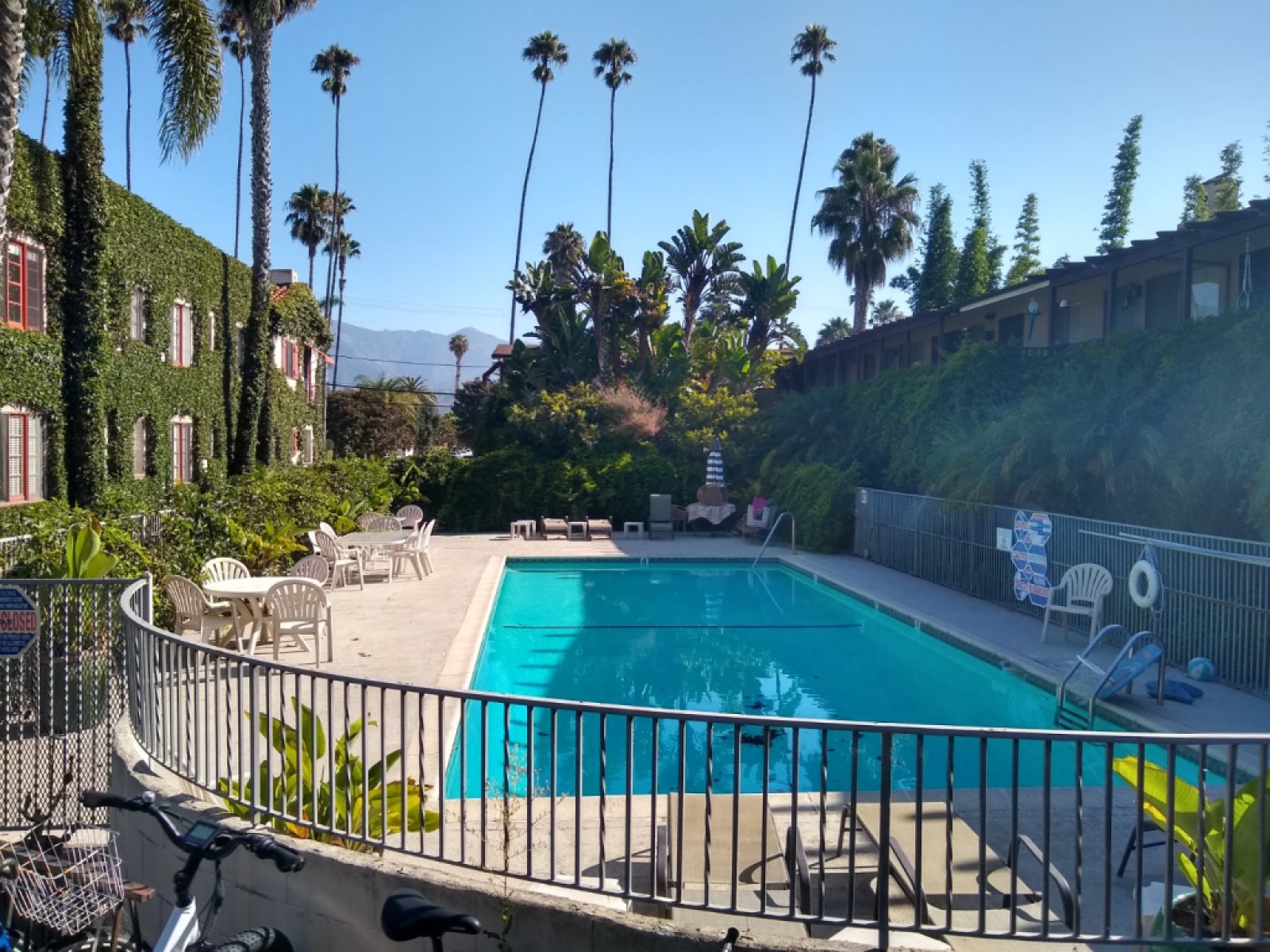More Mass Evictions of Santa Barbara Tenants Threatened
Major Renoviction Cloud Hovers over 52-Unit Apartment Complex

Mike Jordan is in a big fat hurry. Late last week, the Santa Barbara city councilmember got the first installment of what would become an avalanche of e-mails from a whistleblowing resident at a 52-unit apartment building shoehorned snugly into City College’s “Little I.V.” located in the West Beach neighborhood between the freeway and the waterfront. Mass evictions had just started, it warned. Or, in the parlance of the moment, “renovictions” are coming.
By Monday morning, Jordan — a Mesa granddad, longtime homeowner, and self-described “grumpy old white guy” whose district includes the area in question — had convened a top-tiered meeting with City Attorney Sarah Knecht, her assistant Denny Wei, Assistant City Administrator René Eyerly, and Community Development Director Eli Isaacson. Jordan wanted to begin knocking on doors at the apartment complex, once known as Casa Pequeña — presumably because its units are so cozy they squeak — and just renamed “West Beach College Commons” by the new owners, the Koto Group, which took possession of the property September 1. Jordan wanted to start handing out one-page flyers — one side in English, the other in Spanish — alerting residents what their rights were and what resources were available. More specifically, what protections did the city’s new Just Cause eviction ordinance offer?
What could he say? He wanted to know.

Two days before taking possession of the premises, for which the Koto Group paid $16.8 million — Koto property manager James C. Knapp issued the first notice of termination letter. A tenant who had lived there for eight years was told she had 30 days to get out by October 1. “We are giving this notice to you so that you are not under the belief that your lease has been or will be renewed or that you can continue to lease the premises after the termination date,” Knapp wrote. But he did offer, as required by city code, a “one-session conciliation meeting with the landlord.”
Jordan was convinced the notice failed to comply with many aspects of the city’s Just Cause protection ordinance, which was intended to protect tenants uprooted through no fault of their own. But the attorneys at the meeting — not having the lease in hands or knowing how long the tenant had lived there — could not provide the unequivocal answer Jordan sought.
On its surface, however, the Knapp letter certainly appears deficient. For example, he only gave the tenant 30 days’ notice, not the 60 days the ordinance requires; nor did it inform the tenant of the two months of relocation assistance the landlord must pay displaced tenants; nor did it state one of the four reasons deemed acceptable by the ordinance for why the termination was taking place.
In an e-mail response, Knapp stated, “For the discontinued leases, we are following all of the rules pertaining to noticing and fees,” adding, “We believe we have followed all the correct procedures.” Knapp stated that four of the leases have not been renewed so far, adding, “We don’t anticipate non-renewing any other leases this year.” While he did not address how many additional “non-renewals” would be issued next year, he explained that Koto’s insurance carrier is requiring a massive overhaul of the apartment complex’s outdated electric system, installed, he said, in the 1920s. Adding urgency to this work, he said, was the recent fire that displaced 14 students renting space at the Beach City apartment complex, which also focuses on the lucrative student housing market.
However reluctant City Attorney Knecht was to render an instant legal judgement, she stressed she takes any potential violations of the Just Cause law “very seriously.” To that end, she dispatched a legal investigator, Tony Alva, to the apartment complex Tuesday afternoon to knock on doors, interview tenants, and take cell photos of their leases. (Later this week, activists with CAUSE and the Santa Barbara Tenants Union plan to canvass the building.)
If Koto intends to argue the just-cause protections don’t apply because they are “non-renewing” the leases rather than “terminating” them, Knecht said such a “dodge” would not pass muster.
Sign up for Indy Today to receive fresh news from Independent.com, in your inbox, every morning.
Underlying Jordan’s fixation on such legal technicalities is the pervasive economic violence inflicted by the seismic shifts now taking place in Santa Barbara’s desperately overheated rental markets. As real estate investment trusts, such as Koto, buy up larger apartment complexes, long-term tenants living in what is described as “work-force” housing find themselves suddenly displaced with no place to go. Instead, the apartments are rented to transient waves of students able to pay top dollar thanks to parental support.
“This is a life-altering event, and in a very negative way,” Jordan stated. “Some people will never recover. Some could become homeless. For others, it’s like getting hit by a car when you’re 70 years old. This one may be the most obscene example because it’s so big, but other cases happen all the time — one or two units here and one or two units there.”
While Knapp did not describe Koto’s long-term plans for the property, the handwriting is on the wall. Its new name — coupled with ads it’s taken out to fill vacant spaces and the company’s online presence — leaves little doubt. Koto is part of a nationwide real estate strategy, “housing-inspired living,” that buys up off-campus apartment buildings in college towns and transforms them into student housing complexes with all the amenities.
One tenant, who declined to be quoted by name, joked that she now lives in an “off-campus college dorm” like she did when she was 17. “I have found the Fountain of Youth again.”
As economic strategies go, it makes obvious sense. Santa Barbara has an over-abundance of students washing in and out; what until a week ago was Casa Pequeña — with its proximity to City College and downtown, thick ivy walls, swimming pool, and profusion of every exotic species that defines the Southern California beach experience — would be an ideal home away from home for young students.
If Koto’s online ads reflect reality, Koto will be packing two tenants into one-bedroom units, charging each $1,500 a month. A current tenant, Kayla Jensen, has been paying $2,200 a month for her one-bedroom unit since moving in last December. “It’s really nice but really small,” she cautioned. “I don’t see how you can possibly pack two people in there. It would be hard even if it were your boyfriend.”
Jensen is 32, having moved back to Santa Barbara after 12 years away attending college and graduate school. She works remotely for a big company she’d rather not name. Most tenants, she said, are between 30 and 50 years of age, with a few older people as well. Many get around by bike. “It’s a great place,” she said. “It’s also very expensive. But it’s the least expensive place I could find.”
Jensen has not received notice yet, but she is expecting to on November 15. Looking for a new place fills her with dread, she said. “It took me so long to find this one.” Plus, she can’t afford the moving-in costs of paying first and last month’s rent plus a security deposit. “I don’t have $10,000 just lying around,” she said. “It’s just really disheartening,” she said. “You just can’t keep up with how much it costs to live here.”
In the meantime, City Hall will continue to investigate whether the notices given out thus far comply with the city’s Just Cause ordinance.
Correction: An earlier version of this story mistakenly referred to Mike Jordan as a two-term councilmember; he is currently serving his first five-year term, which he was elected to in 2019.

You must be logged in to post a comment.